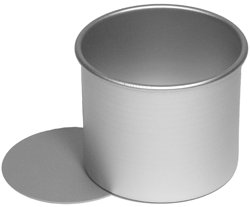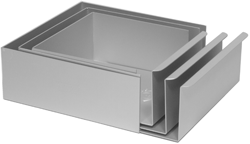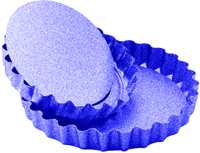 Silverwood silver anodised 4in Pork Pie mould with loose base
Silverwood silver anodised 4in Pork Pie mould with loose baseThe silver anodised surface is characterised by a silver, smooth, easy-release, easy clean finish and the aluminium core is effectively "sealed in" thus making it excellent for most baking purposes.
Silverwood bakeware is one of the premium bakeware selections available, not only because of the extensive range, but more importantly because it's maufactured using Aluminium alloy as its core material .
Aluminium alloy is an extremely efficient heat conductor, resulting in even heat distribution during baking and a reduced cooking times. Anodising effectively seals-in the aluminium, in much the same way as a non-stick coating does and gives bakeware easy-release, easy-clean properties. During processing the molecules of aluminium in the surface layer change their structure to form an "anodic oxide film", hence the name "anodised aluminium". This change is permanent. The surface can never blister or peel - even under the most adverse conditions. Anodised aluminium will never rust.
All these properties ensure that there are no soggy areas or scorched hot spots and hence, it is no suprise that anodised bakeware is the preferred choice of the vast majority of professional chefs.
The key features of Silverwood Bakeware are:
Heavy gauge alloys are used to ensure robust construction;
Many products have a removable base so that the cooked food can be removed perfectly;
Cake pans are a full 3” deep and up to 4” deep, with the larger sizes;
Square cake pans have welded corners to ensure they can’t bow;
Sandwich pans are a full 1½” deep for lighter sponges;
Baking sheets are made from a rigid alloy, which ensures that they don’t distort in the oven
 Silverwood silver anodised 9in Square Eyecatcher© cake pan
Silverwood silver anodised 9in Square Eyecatcher© cake panThe silver anodised surface is characterised by a silver, smooth, easy-release, easy clean finish and the aluminium core is effectively "sealed in" thus making it excellent for most baking purposes.
Silverwood bakeware is one of the premium bakeware selections available, not only because of the extensive range, but more importantly because it's maufactured using Aluminium alloy as its core material .
Aluminium alloy is an extremely efficient heat conductor, resulting in even heat distribution during baking and a reduced cooking times. Anodising effectively seals-in the aluminium, in much the same way as a non-stick coating does and gives bakeware easy-release, easy-clean properties. During processing the molecules of aluminium in the surface layer change their structure to form an "anodic oxide film", hence the name "anodised aluminium". This change is permanent. The surface can never blister or peel - even under the most adverse conditions. Anodised aluminium will never rust.
All these properties ensure that there are no soggy areas or scorched hot spots and hence, it is no suprise that anodised bakeware is the preferred choice of the vast majority of professional chefs.
The key features of Silverwood Bakeware are:
Heavy gauge alloys are used to ensure robust construction;
Many products have a removable base so that the cooked food can be removed perfectly;
Cake pans are a full 3” deep and up to 4” deep, with the larger sizes;
Square cake pans have welded corners to ensure they can’t bow;
Sandwich pans are a full 1½” deep for lighter sponges;
Baking sheets are made from a rigid alloy, which ensures that they don’t distort in the oven
Silver Anodised Bakeware Information Posted By: Blueshoots.com

Silver anodised bakeware combines the excellent heat conducting properties of native aluminium without its disadvantages of softness and porosity. Anodising is an electro-chemical process that hardens the outer layer of the aluminium, giving it an easy-release, scratch resistant surface. It is more expensive than traditional tin-coated and non-stick coated steel, but its longevity and other advantages easily outweigh the additional cost.
Advantages • highly conductive - spreads and retains heat well. • heat efficiency much greater than other bakeware materials. • hard, firm, scratch-resistant surface that cannot peel or blister. • easy release properties without the application of a non-stick coating. • easy to clean. • will not rust. • there are no known health problems associated with anodised aluminium.
Disadvantage • cannot be cleaned in a dishwasher.
Use • anodised bakeware does not need to be seasoned before use - an initial wash in warm soapy water is all that is required. • when baking cakes, grease the pan lightly and dust with flour. Knock out excess flour before adding cake mix. • because the bakeware is so highly heat conductive, always check after 2/3 normal cooking time. • although anodised aluminium has a scratch resistant surface, it is advisable to avoid using sharp knives to cut flans, quiches and cakes in the pan. Cleaning • after use, wash in hot water and washing-up liquid, rinse and dry. • lightly burnt on residue can be removed by soaking the pan. • cooking with certain fats and oils may produce a slight change of colour on the surface of the pan that will not easily wash off. This is quite normal, is not hazardous to health and does not affect the performance of the bakeware. • do not wash in the dishwasher.
Orignal Source : http://www.the-complete-cook-shop.com/



